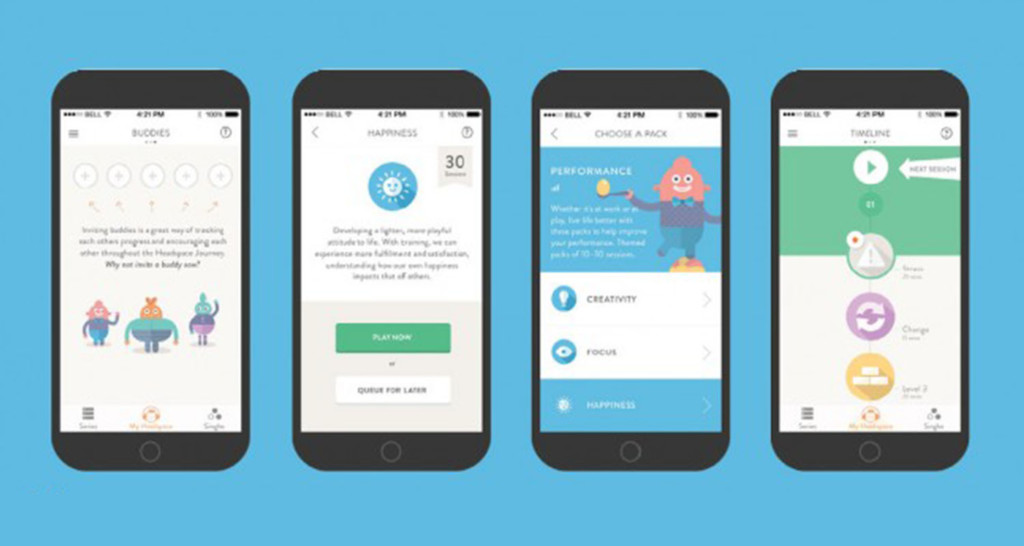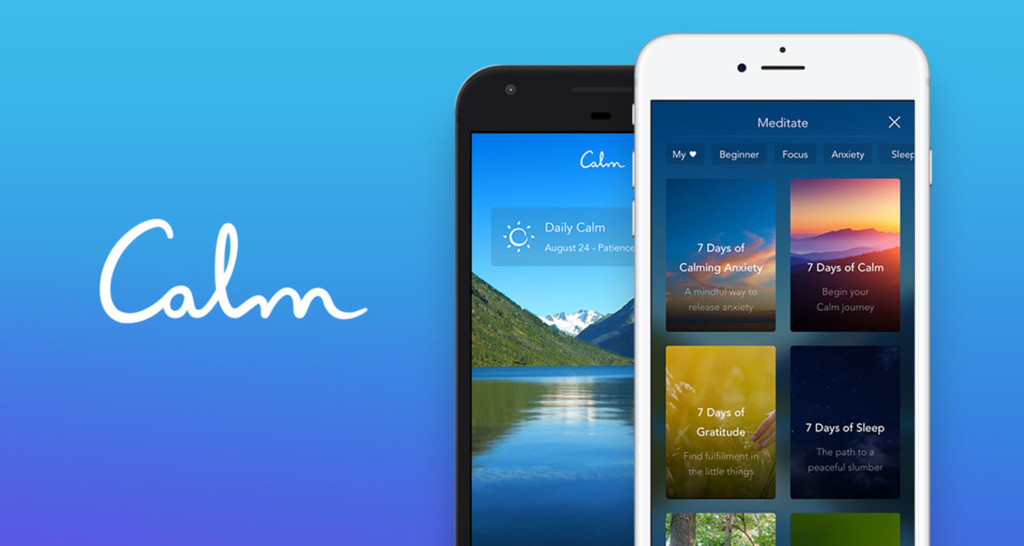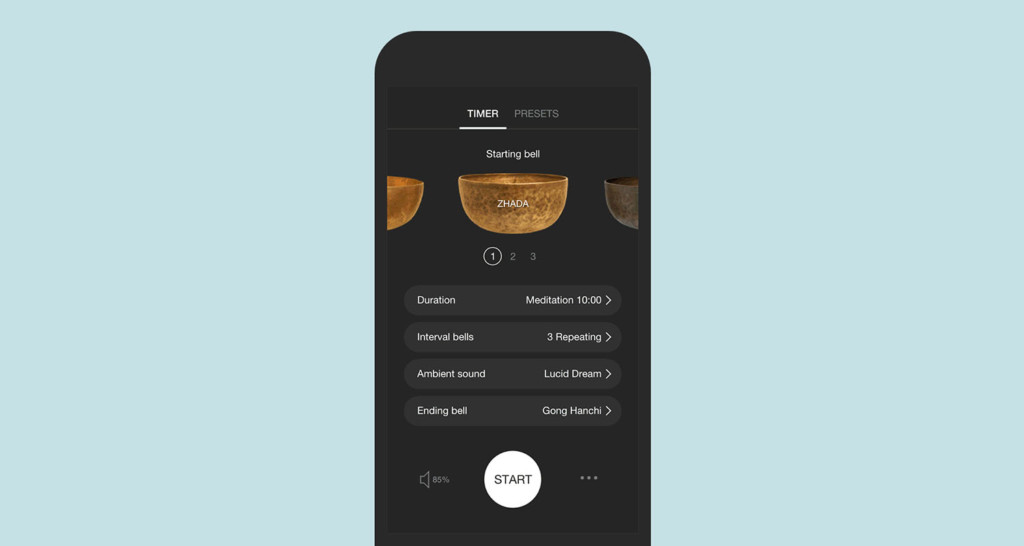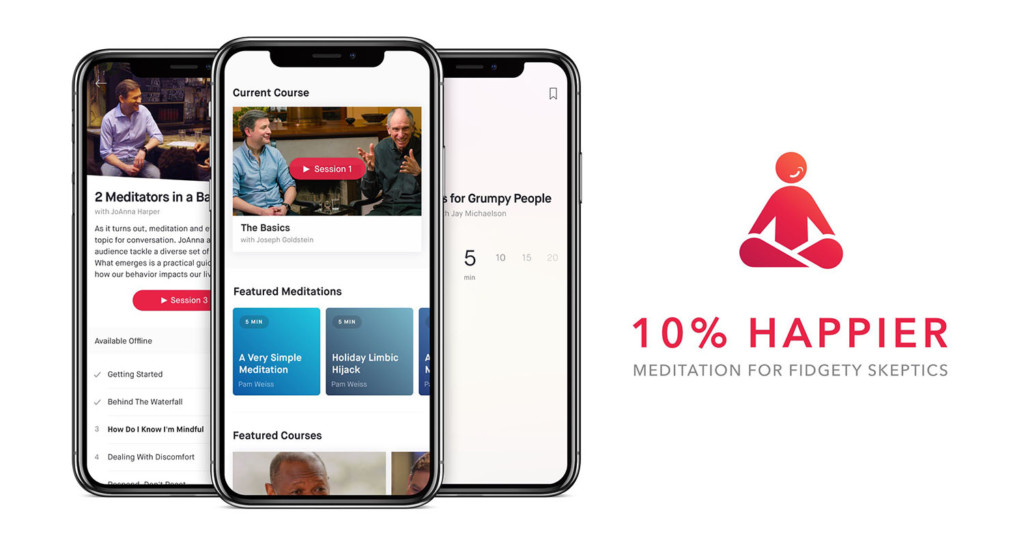
- Meditation sounds simple enough, but it’s not so easy to quiet distracting thoughts.
- That’s where meditation apps come in. They’re like a little guru in your pocket, guiding you into a state of zen.
- Meditation carries all kinds of benefits. If you’re feeling anxious, down, or in pain, meditation can help — dozens of studies show that it works.
- The best meditation apps on the market: Headspace, Calm, Insight Timer, The Breathing App, and 10% Happier. Discover the pros and cons of each.
Meditation sounds simple enough — find a quiet place, cross your legs, and breathe. But if you’ve ever tried it, you probably know that it’s not as easy as 1-2-3 Ommm. Those pesky thoughts start crowding in, and before you know it you’re planning dinner and wondering whether to buy those black jeans you’ve been coveting. That’s where meditation apps come in. They’re like a little guru in your pocket, guiding you into a state of zen.
Related: This Yoga Nidra Routine Will Make You Feel Like You Got a Full Night’s Sleep
Why meditate?
Meditation carries all kinds of benefits. If you’re feeling anxious, down, or in pain, meditation can help — dozens of studies show that it works. Meditation actually rewires your brain, firing up specific areas that calm your nervous system. Here are some of the benefits of meditation:
- Promotes better sleep
- Lowers blood pressure
- Improves mental focus
- Eases anxiety
- Reduces pain
- Increases happiness
- Slows aging
- Boosts heart and immune health
Read on to discover the best meditation apps on the market, and the pros and cons of each.
Related: How to Meditate More Effectively
Headspace
Headspace, created by Andy Puddicombe, a former Tibetan Buddhist monk, boasts 30 million members and 1 million paying subscribers. It’s the Apple of meditation apps — cool, trendy, and user-friendly. It seems everyone and their mother is using it — Olympic athletes, movie stars, and reigning queen of wellness Gwyneth Paltrow.
You can try the meditation app out for free with a “basics” pack or a mini meditation, like a one-minute guided breathing exercise. You have to pay to access the app’s library of hundreds of meditations.
Cost: Subscription options start at $12.99 a month, or you can pay a one-time fee of $399 for lifetime access.
Pros:
- Headspace offers a free 10-day trial pack, consisting of 3-5 minute meditations a day. This gives you the chance to see if you actually like it, before coughing up the cash for a subscription.
- You have a lot options: you can choose a single meditation session, or get “packs” that offer up to 30 sessions on any given area you want to work on, like health, work, or happiness. Within each category you can get more specific — under “happiness,” for instance, you can choose a 30-session pack on self-esteem.
- Simple design with fun animations and a well-organized library of classes.
- You can monitor your progress on your profile page, which records the average length of your meditation sessions, the number of days you’ve practiced, and the amount of hours you’ve meditated.
Cons:
- While the app isn’t prohibitively expensive, it’s not cheap either. Sure, if you’re disciplined and use it everyday, then it’s a fair payoff. You could give up your Netflix subscription to justify the cost, but no one’s telling you to do that…
- Puddicombe voices all the meditations on Headspace. Many people love his clear, no-nonsense tone and Bristol accent (he’s UK-born) — but if it doesn’t appeal to you, you’re out of options.
- All of the meditations are guided — there’s no option to hit a timer and simply savor the silence or soothing ambient sounds.
Calm
Apple’s pick for app of 2017 offers a nice mix of guided meditations, soothing nature sounds, and music.
Like Headspace, you get a free trial to test out Calm. This one’s 7 days, a fair amount of time to see if it’s worth continuing.
Cost: A flat fee of $60 a year, or $299 for lifetime access.
Pros:
- The yearly cost is $30 cheaper than Headspace’s annual fee.
- It offers a nice mix of guided meditations and less structured ones, so it’s easy to customize.
- Here’s something different — you can listen to a bedtime story to help you drift off to sleep. You may recognize some of the narrators — nod off to the soothing sound of Stephen Fry reading you a story set in Provence. You can actually smell the lavender fields and watch as the golden light settles across the valley as you listen.
- The app goes beyond meditation — you can tune in to a master class from health and wellness experts like Elizabeth Gilbert and Shawn Achor.
Cons:
- The design isn’t as straightforward as other apps like Headspace, and it can be a little confusing — especially if you’re a beginner — figuring out the best meditation to pick.
- The sign-up process also isn’t intuitive, and there isn’t a clear breakdown of the different subscription options.
Related: How to Rewire Your Brain for Focus and Calm
Insight Timer
You may not hear about Insight Timer as much as much as you do its venture-backed cousins, but don’t be fooled by its low-key status. Insight Timer is the little meditation app that could, with nearly 5 million people signed up and over 11,000 guided meditations from top teachers around the world.
The app gives you two options — you can either pick a guided meditation (ranging anywhere from one minute to an hour or more) or you can use the timer option — you choose how long you want to meditate for, then pick a bell sound to signal the beginning and end of your meditation. You can also opt for ambient sound like raindrops or choir music to play while you’re in zen mode.
Cost: Free
Pros:
- It doesn’t cost a thing — who wouldn’t want that?
- The design is simple and easy-to-use. There is truly something for everyone here, and you can pick from topics like grief, stress, forgiveness, sleep, and self-love.
- You can set goals and track your progress using the “stats” tool.
- You’re joining a community — you can interact with other users on one of the app’s more than 5,500 forums. Topics run the gamut from mindful eating to lucid dreaming to women meditators — there’s even a passionate discussion going on about Rumi’s poetry.
- Every time you open the app, you’re shown a map of all the people using Insight Timer around the world. It’s a great motivating factor and gives you a sense of community.
Cons:
- The sheer number of options can feel a little overwhelming. Do you pick “Zen Guitar” or “Moonlight” as your ambient sound? And which of the thousands of guided meditations do you choose? Luckily you can narrow down your choices by filtering the meditations by most popular and staff picks.
The Breathing App
Created by bestselling author Deepak Chopra and yogi Eddie Stern, The Breathing App, like its name suggests, focuses only on breath. It’s a specific kind of breathwork called resonant breathing. The goal? To breathe at a rate of 5 to 7 breaths per minute, instead of the typical 15 to 18. It’s the pace that Buddhist monks enter into while meditating, and research shows it can calm the nervous system, lower blood pressure, reduce inflammation, and improve heart rate variability — the changes in time between heart beats.
When you open the meditation app, you first choose your breathing ratio. That’s the number of seconds that you breathe in, and the number of seconds that you breathe out. There are six to pick from, and the app has a guide to help you figure out the best ratio for you. If you’re a beginner, for instance, it recommends 4:4 (4 seconds in, 4 seconds out).
You then get to choose how you want to time you’re breath, and you’re given a few options:
- You can watch as a ball gets bigger (that’s when you inhale), then gets smaller (the exhale). The ball is so mesmerizing, you’ll feel instantly more zen just by looking at it.
- A clock, that counts up on the inhale, and down on the exhale.
- Musical sound — you breathe in when the sound gets louder, and out when it gets softer. This one’s useful if you’d rather meditate with your eyes closed.
You set a timer using a sliding scale at the bottom of the screen, and away you go.
Cost: It’s free!
Pros:
- If simplicity is what you’re after, this is the app for you. There’s no sign-up process — you can start meditating within seconds. Unlike other apps out there, you only get a handful of options — appealing if you’re on-the-go and need something quick that will get the job done.
- It’s free — enough said.
- When you use the sound option to meditate, you open up the possibility of brain entrainment — when your brain waves synchronize with rhythmic sounds. This relaxes you and puts your brain in the same frequency as when you’re in deep sleep.
Cons:
- You won’t find any guided meditations here. Guided meditations are helpful for beginners — it’s nice to have someone holding your hand and showing you how it’s done. With breathing exercises, it’s easier to get distracted by passing thoughts.
Related: Use This Guided Meditation to Clear Your Mind and Find Happiness
10% Happier
If you’re ready to dive deeper into your meditation practice, 10% Happier is one to try. Based on the book by ABC news anchor Dan Harris, this meditation app offers over 350 guided meditations, as well as video courses with meditation experts. A bonus? You can also message meditation coaches and ask them any questions you have about your practice.
Cost: Intro videos are free, but it’s $14.99 a month for full access, or $99.99 for a yearly subscription.
Pros:
- Like a lot of other meditation apps, you get a free trial — this one is a week, so that gives you time to see if it’s a good fit.
- If you’re at all interested in the science behind meditating, or how best to maximize your practice, the app’s library of video courses will appeal.
- You have real-time access to experienced meditators (they need to have at least 10 years of meditating under their belt) — you chat them as you would a Whatsapp message.
Cons:
- This one costs quite a bit more than other meditation apps on the market.
- If all you’re looking for are straightforward meditations, the addition of video courses could be off-putting and feel unnecessary.















